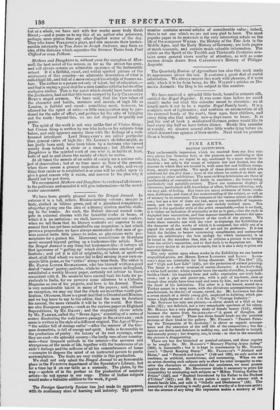We have been greatly pleased with the Bengal Annual. In
exterior it is a tall, yellow, Hindoo-looking volume ; meagre in body, clothed in bilious green, and of a jaundiced complexion ; altogether giving one the idea of a literary cholera morbus stalk- ing to the tombs. As such, the Nabob Annual cannot com- pete in external charms with the beautiful works at home, of which it is an imitation: we shall, however, surprise our readers, when we tell them that its literary contents are superior to any annual that has yet been submitted to our inspection : a fact which proves a proposition we have always maintained—that men of ge- nius cannot write little pieces to order, as physicians write pre- scriptions for a guinea fee. Mercenary associations in literature never succeed beyond getting up a tradesman-like article. Now the Bengal Annual is any thing but tradesman-like : it betrays all that ignorance of "getting up" which distinguishes amateur publications; and yet it is full of originality, of talent, of spirit—in short, of all that which we never fail to find missing in our own ex- quisite little gems, as the "critics' always term them. The editor is MT. DAVID LISTER RICHARDSON, who- has himself written a good deal of "minor" poetry; andwho, while he was on leave in England, established a weekly literary paper, certainly not inferior to those coexistent with it. He seems to have carried hack his taste for pe- riodicals to India, for we perceive some allusions to a Calcutta Magazine as one of his projects, and here is his Annual. There is very considerable talent in many of the papers ; and, without an exception, we may say that the whole are more than worth pub- lication. Of course, there is a great deal that is Oriental and Hindoo; and we beg leave to say to the editor, that the more he localizes his annual, the more valuable it will be to the world. But there sre also European papers,—such as the curious paper on Highland Superstitions, by Mr. GRANT • and the singularly clever article by Mr. PARKER, called the "Seven Ages," consisting of a series of scenes illustratin,g the well-known passage in SHA.KSPEARE each scene is written in thestyle of a different original. The Age of War- " the soldier full of strange oaths"—after the manner of the Ger- man dramatists, is full of energy and spirit. India is favourable to the production of poetry: the luxury of its cool evenings, when they are cool—its splendid scenery—the lordly ease of our country- men—their frequent solitude in the interior—the newness and strangeness of the mode of life, together with the tenderness of an exile's feelings and the softness of all his remembrances of home —conspire to dispose the mind of an instructed person to poetic contemplation. The fruits are very visible in this production. We shall not only admit the Bengal Annual to an honourable place in the FUGITIVE department of the Spectator's Library, but for a time lay it on our table as a curiosity. The plates, by the way — spoken of in the preface as the production of amateur artists—do not appear in our copy. Plates of Indian subjects would make a ;minable addition to the work, if good.


























 Previous page
Previous page